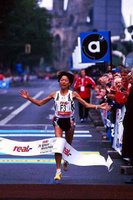
"How much sugar wud switch your body from running on body fat to runnning on sugar. for example would a single barley suger during a marathon switch ones body to suger as fuel???? the reason that I asked is because I was given a barley sugar just before the 20km hill I was going fine until then just over that hill I crashed and burned, the barley sugar was great to suck going up the hill but was it my undoing??"
- Anon
_______________________________
World class runners go at a pace so fast that it is
next toimpossible to take in carbohydrates and
only a few cups of water, so they train for this.
Dear Anon,
Sorry, Mate; but you can't blame the barley sugar for the crash and burn act. It was probably the 8 week build-up to the marathon that was your undoing.
Your inquiry raises a few interesting points that I will try to cover:
- Do at least 12 weeks training before a marathon, preferably the best part of a year. Each week, at least one run should be long and slow and completed without sustenance other than water. Follow the guidelines in the "Training for a Marathon" e-pub. Have a diet that is low in refined carbohydrates (whole grains and unprocessed carbos are essential). It will take at least 12 weeks of this kind of training to adapt; and you will notice with delight that you can go longer and faster during these long runs without getting irresistible carbo-cravings.
- Doing what is recommended in (1) will help your body conserve its internal carbohydrate stores during a race like a marathon, enabling you to run longer and faster before hitting the wall. While there is no "switch" between fat and carbohydrate metabolism (Useage is in terms of ratio, rather than just one or the other), there does come a critical point in body carbohydrate store depletion where the body and brain appear to do a sudden drop in performance - the wall. this can feel a bit like throwing a switch.
- When you are running really hard, it is almost impossible to take in anything other than the smallest quanity carbohydrate without suffering disabling stomach upsets. This is why the training as outlined above (1) is so important. The only other way to avoid hitting the wall is to run much slower and to eat and drink as you go. But, the more you take in, the slower you must go and that means a long time out on the road, which can be just as hard as trying to go fast.
- Trying to eat and drink, including sucking a barley sugar, when going at anything other than a slow pace also causes interference with breathing and running rhythm. This can force the runner ever so slightly into oxygen debt. This hastens the hitting the wall.
With regards to the barley sugars, there is an additional issue:
If you are breathing heavily, jostling and being distracted there is a serious risk of inhaling the barley sugar and chocking to death. This is why responsible coaches ban chewing gum and sweets during training and competition. Barley sugars are fine if only walking slowly; but not if the pace is brisk and definitely not if running. The better choice is a sugary drink and soft caramel bars.
However, Anon, if you start training now (you are allowed 10 days rest) you will find that everything is so much less complicated when you run your next marathon.
3 comments:
I"d say he didnt carbo load enough before the event and ran out of blood sugar, the barley sugar would only stave off low blood sugar for a short time. without it he would probably have come to grief sooner, teh hill would have used up the last of the body glucose stores. too high amileage before undertaking a long run without adequate consumption of energy leading up to the next long run will set you up to hit the wall. once your body stores of glycogen (glucose) are depleted, it takes three days of eating a high corbohydrate diet to fully restock the stores again. the more long runs undertaken the better your body becomes at using fat for fuel but you will never be able to get enough energy from fat alone to be able to keep running. a top athlete might get around 400 calories an hour from fat , running at 12km per hour uses about 600 calories an hour, the very top athletes can burn up to around 600 calories an hour from fat in theory although it has never been measured in the laboratory. given that those athletes will still need more energy than this at race pace they still require significant energy intake to make up the deficit
your body will be using a combination of sugar and fat if you are adequately trained for endurance, the body will do all it can to spare valuable limited body glucose stores, it must retain some in the muscles to avoid "rigor complex) sever unremitting cramping and muscle death, so it will usually still be burning flat even with an intake of sugar but you are unlikely to be able to consume enough sugar anyway to make up for the energy consumption during running. which would be about half a cup of sugar at 12km an hour pace, given you must also consume a signifiant amount of water to digest this you can see how difficult it is to maintain sugar levels while running.
I done a marathon once and run 2 hours 41 minutes, but got a really bad cold afterwards. The doctor said I had a rhino virus. How did I catch this? I never been to the zoo before the marathon.
Post a Comment